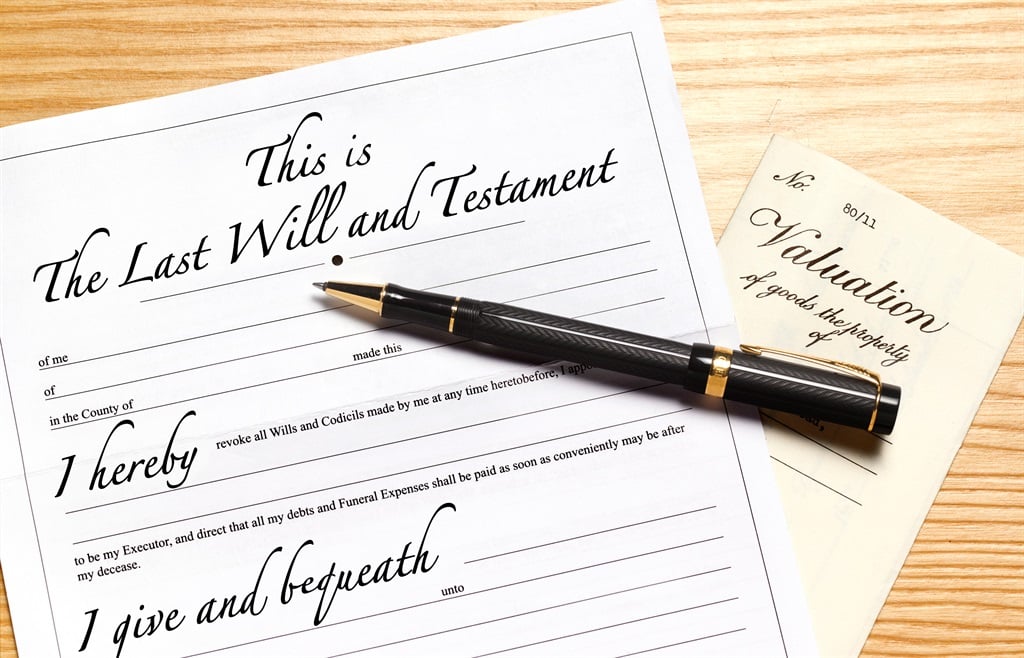
Statistics show that less than 15% of South Africans die with a valid will. Stacy Rouchos explains how intestate succession works.
- For more financial news, go to the News24 Business front page.
While it is ideal to have a valid will as a solid plan for how your loved ones will be taken care of once you are gone, many people die without a valid will or any sort of provision for the welfare of their dependants.
According to a report based on statistics obtained in 2022 from the Master of the High Court of South Africa, less than 15% of South Africans have a will when they die.
This does not mean that there are not mechanisms in place in our law to ensure, in the absence of a will, that your loved ones' wellbeing is safeguarded. However, it is crucial to understand the laws governing intestate succession, as this will empower you to make informed decisions about your estate planning.
How is my estate distributed without a valid will?
Without a valid will, your estate will be distributed to your closest relatives in a pre-determined order, which is set out in the Intestate Succession Act. Although the act can get rather technical as to the exact order of inheritance, the basic line of inheritance applies as follows:
- Firstly, your spouse and your children inherit in equal shares. Should you have no spouse, your children inherit equally. Inheritance treats adopted children equally to biological children.
Should you have no spouse or children still living upon your death, your estate is distributed equally between your parents.
Should either one of your parents predecease you, their share is distributed to their surviving children in equal shares.
Should you have no surviving parents, siblings, spouse or children, the estate falls to the nearest blood relative, which most often in this case, would be the grandparents in equal shares.
Common pitfalls with intestate succession
Although the order of intestate succession seems simple and fair, obviously certain loved ones could easily miss out on inheriting. A common example would be if you and your partner are living together and are not legally married.
Intestate succession confers no legal status on your relationship, meaning that your partner does not stand to inherit anything from your estate. They may be entitled to maintenance, pursuant to a lengthy court case, but inherently they have no rights to your estate.
Issues also arise when the deceased passes intestate with a spouse and several children. In terms of the laws of intestate succession, the spouse and the children of the deceased are entitled to an equal share of the deceased’s estate.
However, if not adequately planned, the surviving spouse may be forced to sell certain assets to pay the children’s share of the estate. Minor children may also have their assets held in the Guardian’s Fund by the state, which can be difficult to access until the minor reaches the age of majority (18 years in South Africa).
We often see conflict where children are awarded equal shares of an estate with no guidelines on how certain sentimental items are to be divided. Should beneficiaries not come to an agreement on who gets the family jewellery or items of sentimental value, the Executor might have no other choice but to sell the items and split the proceeds equally among the heirs if they cannot agree to a distribution.
As evident from the above, not having a will can lead to consequences that drive wedges between family members. Additionally, a lack of estate planning can exacerbate the tragedy of the loss and leave those left behind in a financially vulnerable position.
By drawing up even a simple will and engaging in some forward-planning, you can ensure that any cash shortfalls in your estate, outstanding tax and estate duties are covered. This ensures that your loved ones receive the fair share of their inheritance.
Additionally, it streamlines the process of winding up your estate, leading to quicker and more efficient distribution. Better yet, it also reduces any family conflict which could drag out the administration of an estate for much longer than is necessary.
Stacy Rouchos is Managing Director of Bannister Trust (Pty) Ltd, an affiliate of tax specialist firm Hobbs Sinclair.
News24 encourages freedom of speech and the expression of diverse views. The views of columnists published on News24 are therefore their own and do not necessarily represent the views of News24.




 Publications
Publications
 Partners
Partners












